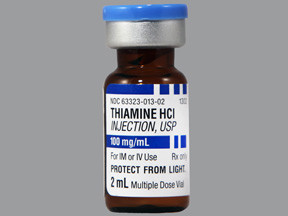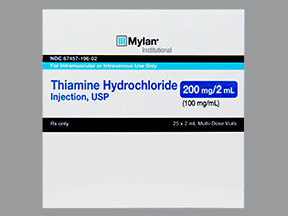THIAMINE - INJECTION
PHONETIC PRONUNCIATION: (THIGH-uh-min)
GENERIC NAME(S): thiamine HCl
Uses
USES: This medication is used to treat or prevent a lack of thiamine (deficiency) when the form taken by mouth cannot be used or would not work as well as the injection. Thiamine is a B vitamin that helps your body to use carbohydrates for energy. It is also important for normal function of your heart, muscles, and nervous system. Most people get enough thiamine in their diet, but certain health conditions (e.g., alcoholism, poor nutrition, pregnancy, stomach/intestinal diseases) can cause a deficiency in thiamine. Serious thiamine deficiency can lead to nerve damage, heart failure, and mental/mood conditions (e.g., confusion, psychosis).
How to use THIAMINE - INJECTION
HOW TO USE: This medication is given by injection into a muscle or vein as directed by your doctor. Dosage is based on your medical condition and response to treatment. If you are giving this medication to yourself at home, learn all preparation and usage instructions from your health care professional. Before using, check this product visually for particles or discoloration. If either is present, do not use the liquid. Learn how to store and discard medical supplies safely.
Side Effects
Precautions
Interactions
Overdose
Images
Reviews
Faq for THIAMINE - INJECTION
Thiamine injection is used to treat or prevent thiamine deficiency, which can occur in people who do not get enough thiamine from their diet or have conditions that prevent the body from absorbing or utilizing thiamine properly.
Thiamine injection is administered by a healthcare professional, usually through a needle into a muscle or vein.
Common side effects of Thiamine injection may include pain or discomfort at the injection site, a feeling of warmth or redness at the injection site, stomach upset, or sweating.
The frequency of Thiamine injections will depend on the individual's condition and the severity of thiamine deficiency. It is important to follow the dosage instructions given by a healthcare professional.
Thiamine injection may interact with certain medications, such as diuretics, certain cancer medications, and some antibiotics. It is important to inform your healthcare provider about all the medications you are taking before receiving Thiamine injection.
Thiamine injection is generally considered safe for use during pregnancy or breastfeeding. However, it is essential to consult with a healthcare professional before using any medication during these periods.
If you miss a dose of Thiamine injection, it is best to contact your healthcare provider to discuss the next steps or rescheduling the missed dose.
Thiamine injection usually starts working shortly after administration. However, it may take some time to see the full effects, depending on the individual's condition and response to the treatment.
Thiamine injection can be prescribed for children experiencing thiamine deficiency, but the dosage and administration should be determined by a healthcare professional.
Disclaimer
IMPORTANT: HOW TO USE THIS INFORMATION: This is a summary and does NOT have all possible information about this product. This information does not assure that this product is safe, effective, or appropriate for you. This information is not individual medical advice and does not substitute for the advice of your health care professional. Always ask your health care professional for complete information about this product and your specific health needs.



No Reviews Yet